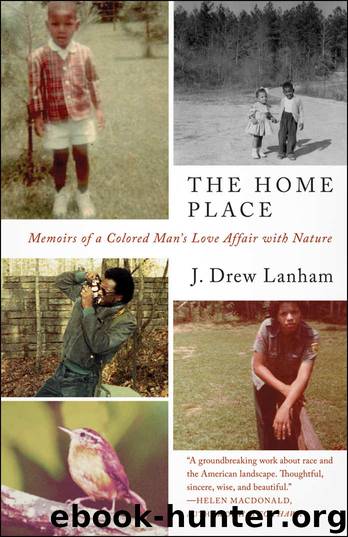The Home Place: Memoirs of a Colored Man's Love Affair with Nature by J. Drew Lanham

Author:J. Drew Lanham [Lanham, J. Drew]
Language: eng
Format: azw3
ISBN: 9781571318756
Publisher: Milkweed Editions
Published: 2016-08-21T16:00:00+00:00
Cows
A cow is as good as a man.
Masai proverb
WHEN DADDY USED TO PLAY THE SONS OF THE PIONEERS SINGING “Tumbling Tumbleweeds” and “Riders in the Sky,” the wavering harmonies floated through the Ranch like prairie ghosts. From the halls, images of wide-open spaces, happy days in the saddle, and sunsets painting the desert seeped into my consciousness. For as long as I can remember I’ve wanted to be a cowboy: a spur-jinglin’, chaps-a-flappin’, ten-gallon-hat-wearin’, lasso-throwin’, painted-horse-ridin’, six-gun-totin’ cowboy. I saw no problem fitting that in with my other careers as fighter pilot and ornithologist. I would be the world’s first bird-watching, calf-roping, sonic-booming black man.
The fantasy of the horse-riding Westerner was further burned into my growing brain by the scorching brand of Hollywood and Technicolor. Built into the appeal of being under big sky on the back of a sturdy steed was the idea of having John Wayne’s swagger, Clint Eastwood’s cool, and Marshal Matt Dillon’s resolve for right. The excitement and danger of a long cattle drive from deep in the heart of Texas to somewhere wilder and even woollier, like Colorado or Montana, glimmered enticingly. In the set of Compton’s Encyclopedias that I consulted on an almost daily basis, my favorite volumes were B for birds; C for cattle, Colorado, and cowboys; and M for Montana.
It was a largely white world that I grew up in. My schoolmates were mostly white. My best friends were white. The westerns I watched were homogenized, too: milky, alabaster, ivory. Besides the occasional Mexican bandit, the horses were the only beings of color. Roscoe Lee Browne’s role as Jebediah Nightlinger, the surly but brave and occasionally poetic chuck wagon cook in the John Wayne movie The Cowboys, was the singular suggestion that black people ever ventured beyond the Mississippi River. It wasn’t until I was well into my teen years that I learned there had been black men who were in fact vital cogs of Western culture. I was heartened to know there had been people who shared my color bronco busting, roping, riding herd, and doing all the things I saw as defining the West. Some historians claim that up to a third of the cowboys on many of the great cattle-drive trails were black men—slaves and former slaves who found a degree of freedom and respect on the prairies and high plains. The names that should be famous—Nat “Deadwood Dick” Love, Bill Pickett, Bose Ikard, “Stagecoach” Mary Fields—are seldom sung by the cowboy balladeers.
If I’d paused on my frequent journeys to Montana in Compton’s M volume, I might have even seen the tall, proud Masai warriors clothed in red robes and roaming the East African plains behind herds of massively horned cattle. These people looked more like me and were more intimately connected to cattle than any boot-wearing white man. The sky above the Mara reserve rivals anything we might imagine in the American West. The bushman’s golden grass waves under the bellies of wildebeests, elephants, and zebras instead of bison, pronghorn, and mule deer.
Download
This site does not store any files on its server. We only index and link to content provided by other sites. Please contact the content providers to delete copyright contents if any and email us, we'll remove relevant links or contents immediately.
Hit Refresh by Satya Nadella(8338)
When Breath Becomes Air by Paul Kalanithi(7264)
The Girl Without a Voice by Casey Watson(7263)
Do No Harm Stories of Life, Death and Brain Surgery by Henry Marsh(6336)
A Court of Wings and Ruin by Sarah J. Maas(6076)
Hunger by Roxane Gay(4218)
Shoe Dog by Phil Knight(4167)
Everything Happens for a Reason by Kate Bowler(4067)
A Higher Loyalty: Truth, Lies, and Leadership by James Comey(4033)
The Rules Do Not Apply by Ariel Levy(3906)
Tuesdays with Morrie by Mitch Albom(3832)
The Immortal Life of Henrietta Lacks by Rebecca Skloot(3826)
How to Change Your Mind by Michael Pollan(3679)
Millionaire: The Philanderer, Gambler, and Duelist Who Invented Modern Finance by Janet Gleeson(3569)
All Creatures Great and Small by James Herriot(3516)
Elon Musk by Ashlee Vance(3455)
Tokyo Vice: An American Reporter on the Police Beat in Japan by Jake Adelstein(3440)
Man and His Symbols by Carl Gustav Jung(3315)
The Money Culture by Michael Lewis(3284)
